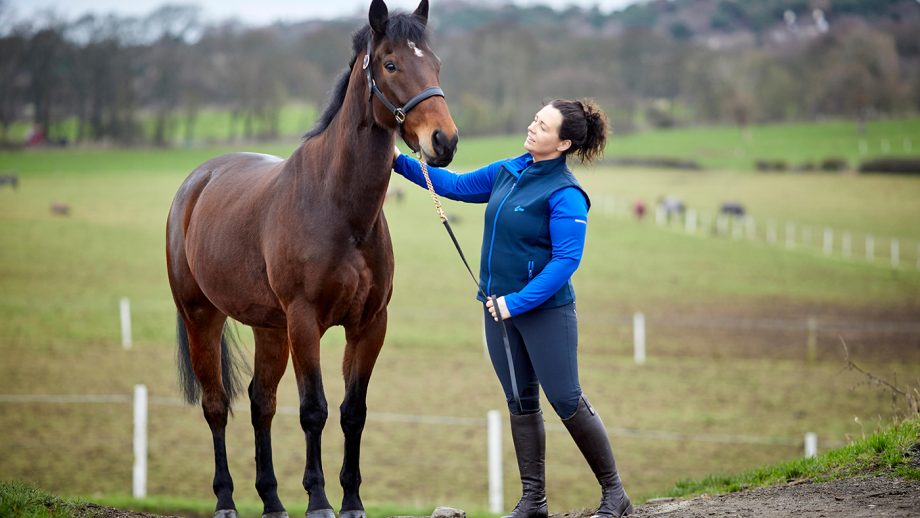Many people have reported increased interest from buyers, and a rise in horse sale prices this year. H&H spoke to insurers, sellers and organisations to find out their view
HORSE sales appear to have increased this year, with buyers willing to pay competitive prices despite the pandemic.
NFU Mutual received a rising number of equine insurance -related calls between January and August, and an increasing number of requests for quotes.
The number of higher-value horses on their books also increased, with more in the £5,000-£7,500 and £7,500-£10,000 value ranges, as well as an influx of horses worth over £15,000.
{"content":"PHA+4oCcVGhlc2UgdHJlbmRzIHN1Z2dlc3QgYW4gaW5jcmVhc2UgaW4gYm90aCB0aGUgbnVtYmVyIGFuZCB2YWx1ZSBvZiBob3JzZXMgYmVpbmcgcHVyY2hhc2VkLOKAnSBORlUgTXV0dWFsIGVxdWluZSBpbnN1cmFuY2Ugc3BlY2lhbGlzdCBBbGVrcyBDb3JyIHRvbGQgPGVtPkgmYW1wO0guPC9lbT48L3A+CjxwPuKAnEN1c3RvbWVycyBoYXZpbmcgbW9yZSB0aW1lIHRvIHNwZW5kIHdpdGggdGhlaXIgaG9yc2VzIGR1cmluZyB0aGUgbG9ja2Rvd24gcGVyaW9kLCBhbmQgc29jaWFsIHJlc3RyaWN0aW9ucyBsZWFkaW5nIG1vcmUgcGVvcGxlIHRvIHRha2UgdXAgcmlkaW5nIGFzIGEgbGVpc3VyZSBhY3Rpdml0eSwgYXJlIGJvdGggcG90ZW50aWFsIFtjYXVzZXNdLuKAnTwvcD4KPHA+PGRpdiBjbGFzcz0iYWQtY29udGFpbmVyIGFkLWNvbnRhaW5lci0tbW9iaWxlIj48ZGl2IGlkPSJwb3N0LWlubGluZS0yIiBjbGFzcz0iaXBjLWFkdmVydCI+PC9kaXY+PC9kaXY+PHNlY3Rpb24gaWQ9ImVtYmVkX2NvZGUtMzEiIGNsYXNzPSJoaWRkZW4tbWQgaGlkZGVuLWxnIHMtY29udGFpbmVyIHN0aWNreS1hbmNob3IgaGlkZS13aWRnZXQtdGl0bGUgd2lkZ2V0X2VtYmVkX2NvZGUgcHJlbWl1bV9pbmxpbmVfMiI+PHNlY3Rpb24gY2xhc3M9InMtY29udGFpbmVyIGxpc3RpbmctLXNpbmdsZSBsaXN0aW5nLS1zaW5nbGUtc2hhcmV0aHJvdWdoIGltYWdlLWFzcGVjdC1sYW5kc2NhcGUgZGVmYXVsdCBzaGFyZXRocm91Z2gtYWQgc2hhcmV0aHJvdWdoLWFkLWhpZGRlbiI+DQogIDxkaXYgY2xhc3M9InMtY29udGFpbmVyX19pbm5lciI+DQogICAgPHVsPg0KICAgICAgPGxpIGlkPSJuYXRpdmUtY29udGVudC1tb2JpbGUiIGNsYXNzPSJsaXN0aW5nLWl0ZW0iPg0KICAgICAgPC9saT4NCiAgICA8L3VsPg0KICA8L2Rpdj4NCjwvc2VjdGlvbj48L3NlY3Rpb24+PC9wPgo8aDM+TW9yZSBsb29raW5nPC9oMz4KPHA+UEVUUExBTiBFUVVJTkXigJlzIGRhdGEgc3VnZ2VzdHMgdGhlIG51bWJlciBvZiBwZW9wbGUgc2VhcmNoaW5nIGZvciBob3JzZXMgcm9zZSBieSAxNCUgZnJvbSBNYXkgdG8gQXVndXN0LCBjb21wYXJlZCB0byB0aGUgc2FtZSBwZXJpb2QgbGFzdCB5ZWFyLjwvcD4KPHA+RnJvbSBBcHJpbCB0byBKdW5lLCB0aGV5IHNhdyBhIDE0MiUgaW5jcmVhc2UgaW4gdGhlIG51bWJlciBvZiBjdXN0b21lcnMgaW5zdXJpbmcgbmV3IGhvcnNlcyBhbmQgc2FpZCB0aGUgcmVvcGVuaW5nIG9mIGZhY2lsaXRpZXMgYXBwZWFyZWQgdG8gYmUgYSBjYXRhbHlzdCBmb3IgdGhpcy48L3A+CjxwPlByaWNlcyBpbmNyZWFzZWQgc2lnbmlmaWNhbnRseSBhdCB0aGUgTGVyd2ljayBTaGV0bGFuZCBQb255IFNhbGUgKDIgT2N0b2JlcikgYW5kIHRoZXJlIHdlcmUgbW9yZSB0aGFuIGRvdWJsZSB0aGUgbnVtYmVyIG9mIG9ubGluZSBiaWRkZXJzIGNvbXBhcmVkIHRvIDIwMTkuPC9wPgo8ZGl2IGNsYXNzPSJhZC1jb250YWluZXIgYWQtY29udGFpbmVyLS1tb2JpbGUiPjxkaXYgaWQ9InBvc3QtaW5saW5lLTMiIGNsYXNzPSJpcGMtYWR2ZXJ0Ij48L2Rpdj48L2Rpdj4KPHA+4oCcVGhlIGF2ZXJhZ2UgcHJpY2Ugd2FzIGdyZWF0bHkgdXAgb24gbGFzdCB5ZWFyLCBhdCA2MjRnbnMgYWNyb3NzIHRoZSB3aG9sZSBzYWxlIFszNzVnbnMgaW4gMjAxOV0s4oCdIHNhaWQgYSBzcG9rZXNtYW4gZm9yIHRoZSBQb255IEJyZWVkZXJzIG9mIFNoZXRsYW5kIEFzc29jaWF0aW9uLjwvcD4KPHA+4oCcT25saW5lIGJpZGRpbmcgd2FzIGludmFsdWFibGUgd2l0aCAzMyBvZiB0aGUgNDEgcG9uaWVzIHNvbGQsIHNlbGxpbmcgdGhyb3VnaCB0aGUgZmFjaWxpdHkuIEFsbCA0MSBwb25pZXMgZm9yd2FyZCB3ZXJlIHNvbGQsIHdpdGggbWFueSB0cmF2ZWxsaW5nIGZhciBhbmQgd2lkZS7igJ08L3A+CjxkaXYgY2xhc3M9ImFkLWNvbnRhaW5lciBhZC1jb250YWluZXItLW1vYmlsZSI+PGRpdiBpZD0icG9zdC1pbmxpbmUtNCIgY2xhc3M9ImlwYy1hZHZlcnQiPjwvZGl2PjwvZGl2Pgo8cD5NYXJ0aW4gRG9ub2hvZSBvZiBHb3Jlc2JyaWRnZSBIb3JzZSBTYWxlcyBhbHNvIHNhaWQgb25saW5lIGJpZGRpbmcgaGFzIGJlZW4gY3J1Y2lhbCB0byBzdWNjZXNzZnVsIHNhbGVzIHRoaXMgeWVhci48L3A+CjxwPuKAnEEgbG90IG9mIHBlb3BsZSBhcmUgYWN0aXZlbHkgYnV5aW5nIGhvcnNlcyBvbmxpbmUs4oCdIGhlIHRvbGQgSCZhbXA7SC4g4oCcSXTigJlzIG9wZW5lZCBteSBleWVzIHRoYXQgcGVvcGxlIGFyZSBoYXBweSB0byBkbyBpdCBhbmQgZW5hYmxlZCB1cyB0byBwdXQgc2FsZXMgaW4gZnJvbnQgb2YgcGVvcGxlIHdobyB3b3VsZG7igJl0IGhhdmUgY29tZSB0byBzYWxlcyBbaW4gcGVyc29uXSBiZWNhdXNlIG9mIHRoZSBjaXJjdW1zdGFuY2VzLjwvcD4KPGRpdiBjbGFzcz0iYWQtY29udGFpbmVyIGFkLWNvbnRhaW5lci0tbW9iaWxlIj48ZGl2IGlkPSJwb3N0LWlubGluZS01IiBjbGFzcz0iaXBjLWFkdmVydCI+PC9kaXY+PC9kaXY+CjxwPuKAnFRyYWRlIGlzIG11Y2ggc3Ryb25nZXIgdGhpcyB5ZWFyLCB3aGljaCBjYW1lIGFzIGEgc3VycHJpc2UuIE91ciBmbGFnc2hpcCBzYWxlIGluIFNlcHRlbWJlciB3YXMgdmVyeSBhY3RpdmUgYW5kIHdlIGhhZCBsb3RzIG9mIGVucXVpcmllcyBmb3Igb3VyIHBvc3Rwb25lZCBHbyBGb3IgR29sZCBTYWxlICg34oCTOCBEZWNlbWJlcikuPC9wPgo8cD7igJxUaGUgbW9yZSBpbnRlcmVzdCwgdGhlIG1vcmUgY29tcGV0aXRpb24gYW5kIHByaWNlcyBpbmNyZWFzZS7igJ08L3A+CjxwPkVtbWEgQmx1bmRlbGwsIG1hbmFnaW5nIGRpcmVjdG9yIG9mIE1vdW50IFN0IEpvaG4gRXF1ZXN0cmlhbiwgc2FpZCBkZW1hbmQgZm9yIGdvb2QgaG9yc2VzIOKAnG5ldmVyIGdvZXMgYXdheeKAnS48L3A+CjxwPlNoZSBzcG9rZSB0byA8ZW0+SCZhbXA7SDwvZW0+IGJlZm9yZSB0aGUgc3R1ZOKAmXMgaW5hdWd1cmFsIG9ubGluZSBhdWN0aW9uIG9mIGJyb29kbWFyZXMgYW5kIGVtYnJ5b3MgKDLigJM2IERlY2VtYmVyKS48L3A+CjxwPuKAnEnigJl2ZSBwdXQgYSByZWFsbHkgbmljZSBjb2xsZWN0aW9uIHRvZ2V0aGVyIGFuZCB0aGVyZSBoYXMgYmVlbiByZWFsbHkgZ29vZCByZWNlcHRpb24s4oCdIHNoZSBzYWlkLjwvcD4KPHA+4oCcT25saW5lIHNhbGVzIHN0aWxsIGZlZWwgdmVyeSDigKhuZXcgZm9yIGhvcnNlcywgYnV0IHRoaXMgeWVhciBldmVyeWJvZHkgaGFzIGJlZW4gcHVzaGVkIHRvIHRyeSBkaWZmZXJlbnQgdGhpbmdzLCBzbyBJIHRoaW5rIHBlb3BsZSBhcmUgYSBiaXQgbW9yZSBvcGVuIHRvIGRvaW5nIHRoaW5ncyBvbmxpbmUu4oCdPC9wPgo8aDM+QnV5ZXIgYmV3YXJlPC9oMz4KPHA+PGEgaHJlZj0iaHR0cHM6Ly93d3cuaG9yc2VhbmRob3VuZC5jby51ay90YWcvYnJpdGlzaC1ob3JzZS1zb2NpZXR5Ij5USEUgQnJpdGlzaCBIb3JzZSBTb2NpZXR5PC9hPiByZWNlaXZlZCBhIOKAnG5vdGFibGXigJ0gbnVtYmVyIG9mIGNhbGxzIHRvIGl0cyBDb3ZpZC0xOSBoZWxwbGluZSBmcm9tIHBlb3BsZSBlbnF1aXJpbmcgd2hldGhlciB0aGV5IGNvdWxkIHRyYXZlbCB0byB2aWV3IG9yIGNvbGxlY3QgYSBob3JzZSBib3VnaHQgZHVyaW5nIGxvY2tkb3duLjwvcD4KPHA+RGlyZWN0b3Igb2Ygd2VsZmFyZSBHZW1tYSBTdGFuZm9yZCBzYWlkIHRoYXQgZm9yIG1hbnkgcGVvcGxlLCB0aGUgcGFuZGVtaWMgaGFkIGZvcmNlZCBhIHN1ZGRlbiBjaGFuZ2UgaW4gY2lyY3Vtc3RhbmNlcywgd2hpY2ggbWVhbnQgbW9yZSBvd25lcnMgd2VyZSBsb29raW5nIHRvIHNlbGwgb3IgcmVob21lIHRoZWlyIGVxdWluZXMsIGJ1dCBzaGUgYWR2aXNlZCBidXllcnMgdG8gZXhlcmNpc2UgY2F1dGlvbi48L3A+CjxwPuKAnFRha2luZyBvbiBhIGhvcnNlIGlzIGEgbG9uZy10ZXJtIGNvbW1pdG1lbnQgYW5kIHRoZSBkZWNpc2lvbiBzaG91bGQgbm90IGJlIHRha2VuIGxpZ2h0bHks4oCdIHNoZSB0b2xkIDxlbT5IJmFtcDtIPC9lbT4uIOKAnEZvciBzb21lLCBsb2NrZG93biBoYXMgbWVhbnQgbW9yZSBsZWlzdXJlIHRpbWUsIGVpdGhlciBkdWUgdG8gZnVybG91Z2gsIGxlc3MgY29tbXV0aW5nIG9yIHBlcmhhcHMgd29ya2luZyBmcm9tIGhvbWUsIGJ1dCB3ZSB1cmdlIHBlb3BsZSB0byBjb25zaWRlciB3aGV0aGVyIHRoaXMgaXMgdGhlIHJpZ2h0IHRpbWUgdG8gYnV5LuKAnTwvcD4KPHA+VGhlIG9yZ2FuaXNhdGlvbiBzdHJvbmdseSByZWNvbW1lbmRzIHZpZXdpbmcgYSBob3JzZSBiZWZvcmUgYnV5aW5nLCB3aGlsZSBmb2xsb3dpbmcgdGhlIGxhdGVzdCBnb3Zlcm5tZW50IGd1aWRlbGluZXMsIGFzIHdlbGwgYXMgY29uc2lkZXJpbmcgYSBwcmUtcHVyY2hhc2UgdmV0dGluZyBhbmQgc2FsZSBjb250cmFjdC48L3A+CjxkaXYgY2xhc3M9ImluamVjdGlvbiI+PC9kaXY+CjxwPjxhIGhyZWY9Imh0dHBzOi8vd3d3LmhvcnNlYW5kaG91bmQuY28udWsvdGFnL3dvcmxkLWhvcnNlLXdlbGZhcmUiPldvcmxkIEhvcnNlIFdlbGZhcmU8L2E+IGRlcHV0eSBjaGllZiBleGVjdXRpdmUgVG9ueSBUeWxlciBhbHNvIHdhcm5lZCBhZ2FpbnN0IGJ1eWluZyBvbiBpbXB1bHNlLCBvciB1bnNlZW4uPC9wPgo8cD7igJxFaXRoZXIgb2YgdGhlc2UgY291bGQgbGVhZCB0byBhbGwga2luZHMgb2YgcHJvYmxlbXMgZm9yIHRoZSBidXllciBhbmQgdGhlIGhvcnNlLCBhbmQgd2UgYXJlIGFscmVhZHkgc2VlaW5nIGhvcnNlcyBzb2xkIGR1cmluZyB0aGUgZmlyc3QgbG9ja2Rvd24gY29taW5nIGJhY2sgb24gdG8gdGhlIG1hcmtldCB3aGljaCBjb3VsZCBiZSBldmlkZW5jZSBvZiBvdmVyLWhhc3R5IGRlY2lzaW9ucyBiZWluZyBtYWRlIGluIHRoZSBzcHJpbmcs4oCdIGhlIHNhaWQuPC9wPgo8cD4K"}
You might also be interested in…
Library image.
Credit: Horse & Hound Stock Archive
A Fell pony living on the hills in its native Lake District in Cumbria.
Buying a horse can be a tricky process but it is possible to find your ideal partner.
Credit: Alamy Stock Photo
Billy Masai sold to a US buyer for £92,000 at the Billy Stud’s first Elite Auction.
Credit: Henry Kinchin
Stay in touch with all the news in the run-up to and throughout the major shows and events during 2026 and beyond with a Horse & Hound subscription. Subscribe today for all you need to know ahead of these major events, plus online reports on the action as it happens from our expert team of reporters and in-depth analysis in our special commemorative magazines. Have a subscription already? Set up your unlimited website access now





